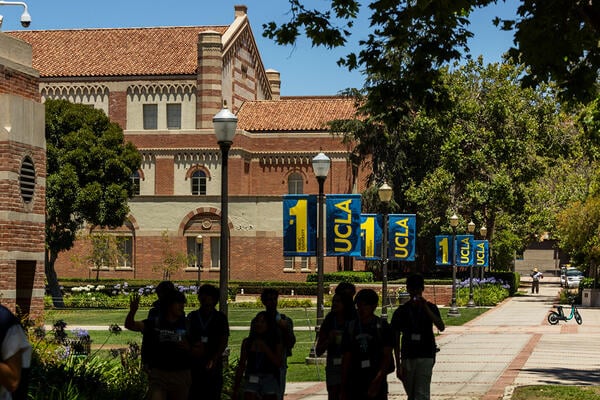
UC Will “Dialogue” With Feds Over Civil Rights Investigation
The UC system says it will “engage in dialogue with the federal administration” over grant cuts.
Juliana Yamada/Los Angeles Times/Getty Images
The University of California system announced Wednesday that it would negotiate with the federal government. The response comes a day after the Department of Justice’s deadline for the institution to express its interest in finding a “voluntary resolution agreement” to the agency’s investigation into antisemitism on the University of California, Los Angeles, campus.
On the line is—according to a UC estimate—$584 million in funding that at least three different federal agencies announced they were suspending in the week between the DOJ’s July 29 letter to system officials and its Aug. 5 deadline for them to respond.
If the UC system comes to a resolution with the Trump administration, UCLA would become the first public university to openly make a deal with the federal government to restore grant funding. In the past month, Columbia and Brown Universities have agreed to collectively pay hundreds of millions of dollars to get their funding back.
In the two-paragraph statement, UC system president James B. Milliken said, “Our immediate goal is to see the $584 million in suspended and at-risk federal funding restored to the university as soon as possible,” but he argued that the “cuts do nothing to address antisemitism.”
“The extensive work that UCLA and the entire University of California have taken to combat antisemitism has apparently been ignored,” he said. “The announced cuts would be a death knell for innovative work that saves lives, grows our economy, and fortifies our national security. It is in our country’s best interest that funding be restored.”
The DOJ’s July 29 letter to the system said its months-long investigations, which remain ongoing, have so far found that UCLA violated the equal protection clause of the 14th Amendment and Title VI of the Civil Rights Act of 1964 in its response to a protest encampment on its campus in the spring of 2024.
In a press release about the letter, Attorney General Pam Bondi said, “DOJ will force UCLA to pay a heavy price for putting Jewish Americans at risk and continue our ongoing investigations into other campuses in the UC system.” The agency said in the letter that it is prepared to sue by Sept. 2 “unless there is reasonable certainty that we can reach an agreement.”
But the Trump administration still hasn’t made clear what exactly it wants UCLA to do. Unlike with Columbia and Harvard, the federal government hasn’t listed its overarching demands. And the administration doesn’t appear to only be interested in addressing last year’s encampment at UCLA.
In their own letters to UCLA last week, the National Science Foundation and the Energy Department announced funding suspensions, citing UCLA’s failure “to promote a research environment free of antisemitism and bias” and saying it “endangers women by allowing men in women’s sports and private women-only spaces.” Both agencies also accused UCLA of considering race in admissions.
The Health and Human Services agency, which includes the National Institutes of Health, didn’t provide Inside Higher Ed with NIH’s grant suspension letter, and an HHS spokesperson declined to comment Wednesday. A DOJ spokesperson also declined to comment, and the White House didn’t respond to a request for comment. UC system spokespeople didn’t provide interviews or answer written questions.
UCLA chancellor Julio Frenk said in a separate statement that the institution is doing everything it can “to protect the interests of faculty, students and staff—and to defend our values and principles.”
“We will continue to hold town halls, convene office hours and share information with you, particularly those who are in the most directly affected areas,” Frenk told his employees. “This includes departments that rely on funding from the National Science Foundation, National Institutes of Health and Department of Energy.”

Source link


